Thea Atkinson's Blog, page 18
August 19, 2011
THROWING CLAY SHADOWS launch: win an ebook package
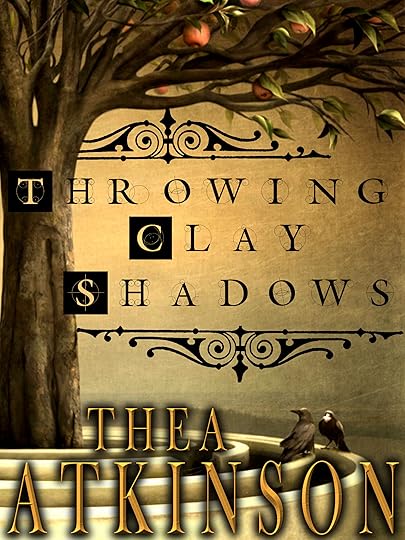
Introductory price of .99c
Today is the launch of Throwing Clay Shadows. It's set on the Isle of Eigg, Scotland, where my genealogical line travels. If you've read Formed of Clay, you'll see it has some familiar characters, but it stands nicely on its own.
to celebrate, I'm offering a bunch of freebies and deals and there are tons of ways to enter.
Prize from the blog: 3 prizes: Both novella and novel free from Smashwords. Just do one or all of the following to get entered into the random draw
Each subscription to my blog receives one entry
comment on my post receives one entry
Share this post on FB then go to my Fan Page to leave a comment that you shared: two entries
Tweet this link (add @theaatkinson to the tweet so I can track you) gets one entry
That's either 5 entries or one. Whichever you choose, I do hope you win. The bonus for the winner who does them all? I'll throw in a copy of Anomaly. (if you are already subscribed tot he blog, don't worry.)
The bedrock of family and story
Thea Atkinson
My Grandmother was a war bride. I never really understood what that meant as a kid. I assumed it meant she'd left her country to marry a man she'd met during the war. And it does. It does mean that. But I've realized over the years that it means so much more.
I learned during my early school days that the province I call home: Nova Scotia means New Scotland. Because of the heritage of this long strip of land surrounded on three sides by Atlantic ocean, it's named for my grandmother's home. I imagine that despite her love for her new beau, it must have given her some pause, some sense of comfort and security, that she'd be moving to a place that would seem like her own home. The name must have taken some of the fear away.
She'd seen hardship in Glasgow. I know this. I imagine the hardships she faced were even more daunting here if only because the support system we all take for granted was gone. She had no family to run to when she and her new husband fought. She had no mother to coddle her when she nursed her first born and struggled with trying to figure out what it meant to be a mother, how to make formula, change diapers, calm the squalling in the middle of the night. She had no friends to relieve the stressful hours with chitchat over a hot cup of tea.
And she had no one to turn to when she and this new husband realized they'd made a mistake.
I think she went home once, packed up my mother and rode the waves back to Scotland. I wonder what they thought of her back there: was she a failure, were they excited to see her? She had brothers who I don't doubt would have torn my grandfather limb from limb if they'd been able to get hold of him. (what brother wouldn't feel such fierce protectiveness over a hurt sister? See: my blog post about my own brothers)
But she returned to Nova Scotia and she stayed here. My mom tells me stories of her walking home from work in the winter. They had no car and 'work' was 10 kms away, in the town. I think of the 10km drive from my house to my work and it takes 15 minutes. What must it have been like to walk to work everyday, work, and then walk home. So you can feed a family, put clothes on your three girls' backs?
I only know that in the story, my grandmother's nylons are torn and holey in places. Her shoes are soaked. She's wet and cold from the snow. I take snow in the winter for granted. I just assume the snowfall is going to be a foot high with temperatures below freezing and a wind chill that gains fierceness from the Atlantic air. In Scotland, the average precipitation is 9cm in January. The average low temperature is 1degree.
In the story, my grandmother doesn't complain. Just hangs her threadbare coat behind the stove and asks for a good hot cup of tea.
That hardy Scots will, I suppose, as hard as the brogue that never left her despite living in an area where English and Acadian French mix to form an odd sort of accent that most folks in my area call Fringlish. How she must have stood out in that.
What kept her here, I don't know, but I imagine it had to do with family. Her new family. Those three girls married and had kids of their own. Her grandchildren–my brother and I especially–practically lived there. We ate pizza late at night in her bed and watched The Rockford Files. She made me Koolaid and told me tales of Nessie and Robbie Burns.
Is it any wonder I've remained fascinated with Scotland?
-30-
Today is the launch of Throwing Clay Shadows.It's set on the Isle of Eigg, Scotl
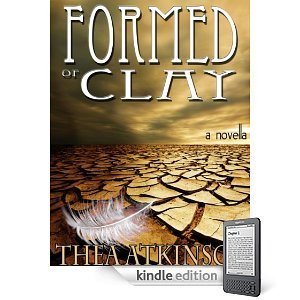
Just 99cents on Amazon
and, where my genealogical line travels. If you've read Formed of Clay, you'll see it has some familiar characters, but it stands nicely on its own.
to celebrate, I'm offering a bunch of freebies and deals and there are tons of ways to enter.
Prize from the blog: Both novella and novel free from Smashwords. Just do one or all of the following to get entered into the random draw
Each subscription to my blog receives one entry
comment on my post receives one entry
Share this post on FB then go to my Fan Page to leave a comment that you shared: two entries
Tweet this link (add @theaatkinson to the tweet so I can track you) gets one entry
That's either 5 entries or one. Whichever you choose, I do hope you win. The bonus for the winner who does them all? I'll throw in a copy of Anomaly. (if you are already subscribed tot he blog, don't worry.)
Filed under: Thea bits








August 15, 2011
Today is about Frogs guest post by @themartinking
 Today is about Frogs
Today is about Frogs
by Martin King
1976 was an absolute scorcher in England. Many will remember it well for the giant ladybirds. In fact I remember go for a walk on hill near to my home called Bobpreston and the field was full of them. But that is a story for another day. Today's story is about frogs.
Near to my home was a small quarry known as Rainhall Rocks. During the industrial years where cotton was king and it was transported along the canal networks, a small offshoot was created that led to Rainhall Rocks. It meant they could ship the stone to the canal very easily. However the tunnel connecting the two collapsed many years ago creating a small narrow lake.
A country lane cut the water area in two with a tunnel underneath linking the two sections together. But this too had collapsed in time. So if you are still with me at this point, you had two landlocked mini lakes separated by a country lane. As kids we used to play down there all the time.
Well one day I was on my and was walking towards Rainhall Rocks looking for my friends. As I approached the area it seemed as the whole road was moving. The closer I got, the more I realised it wasn't the road that was moving, but it was what was on it – a sea of baby frogs! I'm telling you now; this was the most frogs in one place at one time, ever!
Due to the heat wave, there was abnormal amount of frog spawn laid, in one side of the lake. The day I walked along the lane was the day when nearly all the baby frogs had an internal homing device telling them to get to the other side. And that was the day I witnessed the march of the frogs!
These blogs are all about fun and sharing. Thank you for reading a '#100blogfest' blog. Please follow this link to find the next blog in the series: http://martinkingauthor.com/blog/7094550076
-30-
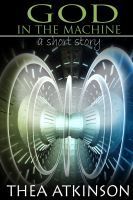
God in the Machine is free for your ereader
Before you go, remember to download the free short story on Smashwords or Feedbooks:
God in the Machine by Thea Atkinson
Filed under: guest blogging








Is a book right for your message? guest post by @ajbarnett
Why Write A Book?
a guest post by AJ Barnett

Purchase Without Reproach
"Every author, however modest, keeps a most outrageous vanity chained like a madman in the padded cell of his breast."
- Logan Pearsall Smith -
Message, What Message
So you have a story deep inside, and its bubbling to get out. You simply must put it across to people. You are passionate about it. You're convinced there's an audience waiting to read it, and you're intent on writing a book…
Wait! Is a book really the right vehicle for your message?
Other Mediums
Will another medium be more suitable for your idea? Have you considered writing it as a short story, or an article? Or will it be better suited to a television documentary or radio play? Okay, I realise a book can serve as a prelude to one of these, but sometimes it's better to aim for a different medium right from the outset, rather than try to wedge your grand idea into a book.
Why write a book? A book embraces between 50,000 and 250,000 words – a lot of time and effort. Not everyone can cope with writing so much on a subject – especially if they have no previous experience. The inspiration you believe will make a novel might actually only furnish sufficient words for a short story.
In The Swim
There's little to be said for embarking on a writing career with a 100,000 word book as a first project. It's rather like swimming the English Channel when you've never dipped your toes in water. Sometimes it's prudent to start with lesser undertakings. Small assignments allow you to acquire a feel for words and how to handle them before embarking on a larger project. Why not learn to swim a length before swimming a mile?
Okay, so a few paragraphs in a local church magazine might not sound impressive – but you'll finish it faster, and you're more likely to get it published than a full length book. It will certainly be in print quicker than a book would. Writing a short piece of work will give you most of the stimulus and satisfaction of writing a long one – and you will finish it quicker and lose less, if your work isn't accepted. So, why write a book at such an early stage in your writing life?
If you later decide to move on to larger projects, you'll be furnished with evidence of your published material. Publishers prefer publishable writers.
Speculate to Accumulate.
College lecturers and researchers, accumulate status by publishing articles in academic journals. Poets work in much the same way. It's unusual for poets to launch into publication in book form. Most poets begin by introducing poems in magazines and suchlike, and move onto anthologies before progressing to their own collections.
Do be circumspect and ask yourself why you want to write a book. Ask yourself whether you're ready to write and sell a book, or whether you'd improve your chances by gaining experience, understanding, and respect, by writing on a smaller scale.
Read more posts from AJ Barnett on Tell Me A Story
-30-
WITHOUT REPROACH
Jenny is not related to Spanish artist, Juan Garcia. She has never heard of him, never met him, and certainly never been there before… So why does she vaguely recognize some of the rooms and smells?
It freaks her out when Juan bequeaths her the enormous villa in his Last Will and Testament… Especially when there is a painting of her in the entrance … and she is totally naked…
Without Reproach is romantic suspense, available from Amazon Kindle $2.99
-30-
Aside from Thea: I wrote a post about my motivation for one of my novels here. Feel free to check it out.
Filed under: guest blogging








August 8, 2011
Tanith Davenport guests: Do you write what you should? @tanithdavenport
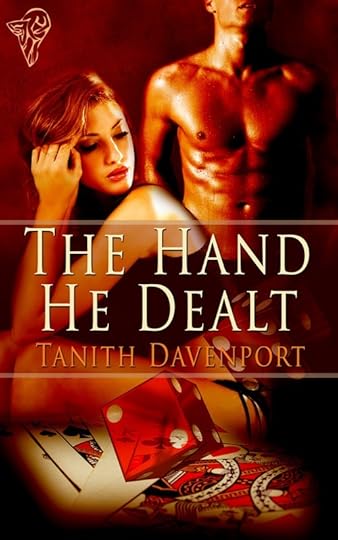
Purchase a copy
Do we write what we should be writing?
One of the first things I was told about writing, after "finding your voice", was "finding your genre". Write what suits you, they said, pointing to the example of a sombre middle-aged man who wanted to write chick-lit and was now a successful crime novelist. Find the right genre and everything will fall into place.
Well, I wanted to write women's fiction. Nice broad range there, I thought. Serious or frivolous, romantic or tragic, plenty of opportunities and probably the best chance for a shot at a prize. What's not to love?
Except I didn't read women's fiction.
And my first novel was rejected by three agents for having too much sex.
Pitch it as erotica, I was advised by a book doctor. Erotica, I thought? Isn't that the stuff at the back of the store that everyone thumbs through and doesn't buy?
Well, no, it's not actually.
But because I felt that I should be writing women's fiction, with grand ideas about more substance and having something to say, I had completely ignored the fact that I actually rather like writing erotica.
I read it, of course, and always have, but always viewed it as having one specific purpose – to titillate. Not something a serious writer should be doing. Certainly I'm not alone in that view. I've heard many times that what I write is considered "junk". Rather like having dessert for dinner instead of a proper meal.
But hey, if I like it, why shouldn't I have dessert for dinner?
Erotica doesn't have to have only one purpose. Sex is a complicated part of our lives. Erotica writers use it for character development, for plot, to make a statement, to show the beauty and tragedy of life. And sometimes we also write it for fun.
So if I hadn't decided to pitch my novel as erotica, I would have shot myself in the foot. Because it would never have been accepted, and I would have spent years struggling to write what I considered literary while secretly wanting to write about sex.
I've barely begun, and I've already been asked when I'm going to write a real book. And I wonder how many other unpublished writers are struggling with genres they aren't suited to, being told that romance is junk and horror makes them "weird" and erotica is "filth" by people who know nothing about it, although they may well say they could write a book too if only they had the time.
I'll stick to what I'm good at, thanks. Anyone for dessert?
-30-
Tanith Davenport lives in Yorkshire with her long-suffering husband and pampered cat. She loves to travel, listens to rock music in her spare time and likes to pretend she is as innocent as she looks. She writes erotic romance and has just had her debut novel The Hand He Dealt published by Total-e-Bound Publishing.
Astra Scott likes to live life to the full. A sorority girl and Gaming Management student, she spends her days studying and practising guitar, and her nights partying or working at the Fountain Casino, where she has an internship as part of her final semester. The only blot on her landscape is Ash Drake, her best friend Sasha's boyfriend. Arrogant, physical and blond, Ash has never forgiven Astra for her rejection months earlier and enjoys annoying her at every turn.
But when Astra's boyfriend Harry reveals a shocking secret, Astra responds in the only way she can think of: by finding a way to take on a more attractive, masculine role in the relationship. Her experimentation with sex toys finds a surprising outlet in Sasha, but when Ash discovers their secret and wants to get involved, Astra finds herself torn between dislike and desire… and as their undercover relationship grows, Astra finds herself falling in love, a path she feels can only end in heartbreak. For Ash may be the only man whose own fantasies are a match for hers, but can she knowingly steal his affections from her best friend?
-30-
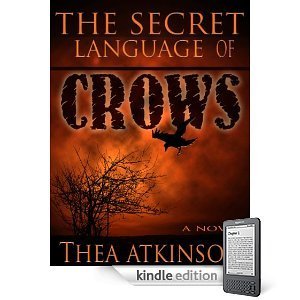
Samples are always free on Amazon
BTW: Like Tanith, I don't write women's fiction: at least, it wouldn't be labelled that way by any publishing house.I always find that label peculiar anyway. I mean, half the population is made up of the female gender. Heck, I'm a woman. I like good erotica, I like good genre fiction, I like good crime fiction, I like good YA. The truth is, I like good story, and I write what I like despite genre: I like good characters and I think that's what I deliver in Secret Language of Crows. No formal reviews yet on Amazon, but two on Goodreads and the buzz is good.
Filed under: guest blogging








August 6, 2011
Runaways and Fiction
by Thea Atkinson
I wanted to run away once.
Not because my childhood was so horrible I felt I needed to escape. Well, I did have 3 brothers who tormented the living snot out of me, but that's not the reason.
No.
I wanted to run away because my best friend had decided to. I remember thinking how brave that decision was and I envied her, her courage. In fact, I remember envying a lot of things about her: she got awesome bendable leg Barbie dolls for Christmas while mine were plastic, hard edged ones that spread-eagled when I tried to sit them down. She had a minibike–my dad couldn't afford to buy me a pedal bike. She had a big fisherman father's shed to play in with coils of rope as high as you stood.
You don't need to tell me now that I envied her for all the wrong reasons–especially in light of the fact that my home was such an amazing place for a child to grow up that I bring my daughter there every week just to connect with all of her cousins and aunts and uncles. We're close, my family. But I digress.
I envied this friend also because even at our tender ages she was a great writer. She even won a radio contest with her essay. She had something, some spark that just made her writing electric.
Still, with all that stuff in her favour, she wanted to run away. The best I could do as her BFF (a term not used back in the day) was to help her.
We spent weeks (probably days, actually) sweeping off some old linoleum covered floor that was the only remnant of a shed on the back of her father's property. We dug up fern roots that we'd learned were edible in science class if you peeled all the black stuff off. They tasted like popcorn or nuts when we tried them out, and we stored them in baggies to keep them clean when we stuffed them under the floorboards.
With everything ready, she declared the date: our mutual birthday. Mid summer. She should be able to have good weather till she got where she was going.
The last bit was a bit fuzzy. All she knew was she was going to sleep at the old floor overnight and take off in the morning and head out–somewhere.
I was afraid for her, but if anyone could do it, she could. I wasn't sure why she wanted to leave–heck, it could be just the spirit of adventure–but I knew right then she would make it.
Come supper time of my birthday I hadn't heard a word from her all day. I blew out my birthday cake candles and spared a thought for the slice I would have liked to offer her, but she was miles away by then. Gone.
I sat on my front step and stared at her house. I was poised to expect the phone to ring, for her mom to demand I tell her where she was, and I agonized over what I would say. I couldn't tell the truth; I'd promised to keep the secret.
It was lonely sitting there. I remember that. That was the first time I realized I was never going to see her again. The first time I realized that I would never want to be away from my own family that way. Despite 3 boys that picked on me, they would also do worse to anyone else who dared do the same. My mom and dad gave me as many hugs and kisses as they could fit in a day.
I didn't have things, but I had family.
And that was the most important thing.
I ached for her that she was leaving hers behind.
All this I mulled over as I stared across the road at her yellow house, the VHF aerial tower in her dad's backyard, the paved driveway.
Then I saw her.
She was ambling down that drive and across the road, not looking up, not saying anything, just moving up to my spot on the step, sitting down next to me.
"What happened?" I asked, both terrified she'd gotten caught and thrilled to see her.
She shrugged. "Nothing."
"Oh," I said, not sure what else to say.
"The popcorn rotted."
She said it by way of explanation, but there was something else trilling beneath the admission, something that had us both sitting silent.
We both sat there saying nothing after that, just stared out at her backyard where we'd had so much fun. Both of us thinking, no doubt, about all the things that as children we were beginning to realize: that family has a connection to us that runs deep into our cores.
And that there's really no place like home .
-30-
Olivia has her own secrets that both make her run away and pull her back home. Find out what they are in Secret Language of Crows.
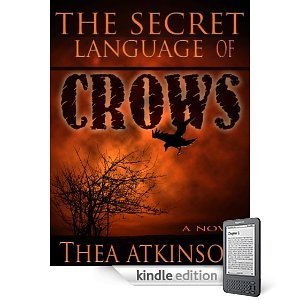
Purchase on Amazon
.
Filed under: Thea bits








August 3, 2011
Writer Wednesday: that junk in your trunk is Steampunk @goblinWriter
Sometimes you find someone on Twitter that a the most intriguing handle (@goblinwriter) (mine is the very boring @theaatkinson) , and then you discover they have mentioned you on their blog, and THEN you realize they write Steampunk. You have no idea what Steampunk is.
You don't want to say so, because well, you'd look ignorant and uneducated and so you sully forth, chatting and Rting, and reading blog posts and then you realize: Hey! Not everyone knows what SP is! I'm not alone.
What a great guest post that would make. Even better: what an awesome writing exercise it would make. So I asked this goblinwriter if she would guest post on my blog for Writer Exercise Wednesday and I'm delighted to say, she said yes. Here's what you've all been waiting for:
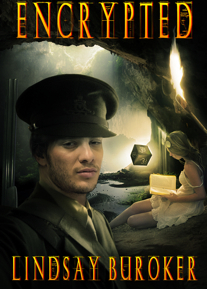
Purchase for your Kindle
Writing Exercise: Escape the Dungeon!
Thea asked me to talk a bit about steampunk and offer up a writing exercise for you good folks.
I'm not sure I qualify as an expert on steampunk, but I am an indie fantasy author with a fondness for filling my characters' world with steam-powered machines and industrial-revolution-era gadgets that might have been but never were. Airships, steam-powered dog sleds, mechanical attack butterflies… You get the picture.
I also have a fondness for characters who can use their brains to get themselves out of trouble. Hey, my childhood idols were Spock and MacGyver. What can I say?
Thus, for today's writing exercise, I'm going to challenge you to come up with a creative way to get your characters out of a dungeon cell, police interrogation room, serial killer's basement, a garden shed, etc. The setting is up to you, and you needn't be a fantasy author to give this a try.
Here are the rules:
The door is locked, there are no breakable windows, and brute force won't work.
You cannot trick the guards by having your character's sidekick pretend to be sick (sorry, but Hollywood has used that one to death!).
You can place up to three items in the prison for your characters to use, but they must be logical finds, such as a water heater in a basement, roadside flares in the trunk of a car, fertilizer (MacGyver's favorite bomb-creation material!) in a garden shed.
That's it! Have fun with this.
Oh, and while you're thinking of your brilliant escape scenario, I invite you to check out some of my fantasy books. My goblins are particularly known for thinking their way out of situations with their inventions and schemes (hey, when you're three feet tall, brute force isn't much of an option!), and, Kali, the young heroine in my Flash Gold novellas is a self-taught tinkerer who's been known to bring down a pirate-infested airship with nothing but the supplies on her steam-powered dog sled….
You can also visit my e-publishing blog if you're looking for tips on ebook creation, book promotion, or social media. Thanks for reading!
###
If you don't like this exercise, The Writing Network (twitter ID @theladywrites) has a different
one you can try. It's just about getting creative and feeling inspired. Doesn't matter to me whose exercise you do, just exercise.
BTW: by Thea
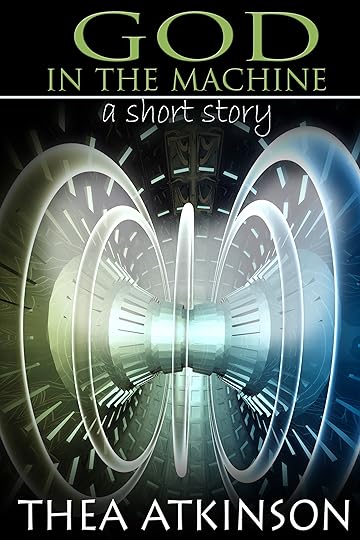
God in the Machine is free. totally free
I don't write Steampunk and I doubt I'd be good at it, but I do think the cover of God in the Machine is reminiscent of what I would think SP conveys. It's free at feedbooks and Smashwords. Go on and download it.
Filed under: writerwednesday exercises








July 27, 2011
Talking about birds on a wire: a guest post by @jarrettrush
I get asked it all the time; you do too, I imagine, if you're a writer: "Where do you get your ideas?"
I dread that one almost as much as I dread the question about what my book is about. I still haven't nailed that one yet. The truth for me is that I really don't know.In a post on Jason McInytre's blog, I told him that my approach to writing is one of discovery and that it's always a pleasant surprise to find something I write holds up to the research. He seemed to 'get it', which leads me to believe that stories and ideas are out there in the ether somewhere, waiting to be pulled down and brought to life.
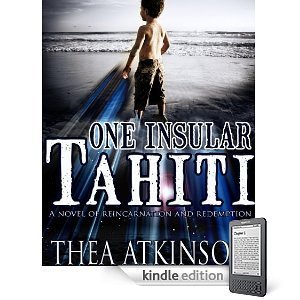
If you're lucky OIT is still on sale at Amazon for 99c
For instance, in One Insular Tahiti, I wanted to freefall write from a famous first line of a novel. I picked THE most famous first line I could think of: Moby Dick's "Call me Ishmael." What ensued was a full novel about reincarnation and the idea that who we were can shape who we are.
Free Stuff:
Later, Jarrett Rush will guide you through a writing exercise, but first I'd like to mention
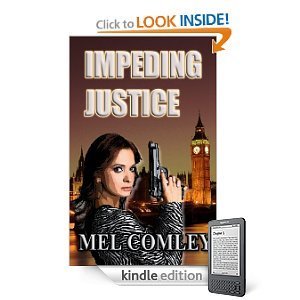
comment to enter the montly draw
that I'd like you to come back and tell us how it went. this month the gift for a lucky random commenter is Mel Comley's Impeding
Justice. Simply comment on Writer Wednesdays and get entered into the monthly draw.
Need More Exercise?
If you don't like this exercise or you still feel the need for some inspiration, The Writing Network (twitter ID @theladywrites) has a different one you can try. It's just about getting creative and feeling inspired. Doesn't matter to me whose exercise you do, just exercise.
And now without further Ado:
To get your engines revving, Jarrett Rush takes over the blog post
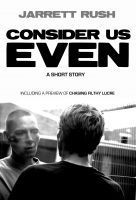
Buy Me from Smashwords
by Jarrett Rush.
I think most writers are interested in the creative process of others. I know I am. I like to read how someone's latest masterpiece came about. How did it go from that nugget of an idea to a finished product? It's the nugget that interests me the most. Where does it come from? How do we get ideas? Seriously, if you know, please leave a comment and tell me.
For me, my book, Chasing Filthy Lucre, is ultimately the result of lunch. Or really the walk back to my desk at my day job after lunch. My mom liked the movie "Bird on a Wire" when I was younger. For a reason I can't explain, the title popped into my head while I was walking down the hall heading back to my office. I let my mind spin the rest of the walk. I have to climb three flights of stairs and down a long hallway, so there was a little time. When I sat back down at my computer I banged out the following bit of dialogue. (It was OK. I was still on my lunch break. )
"How long have you been on the wire?"
She was blonde, tall, and entirely fake. I could practically hear the servos fire when she batted her eyes.
She slid her long legs a bit closer and swirled her drink in her glass.
I grunted an answer and she asked me to repeat it.
"For as long as I can remember," I said again and kept staring at our reflection in the mirror behind the bar.
"Oh, a lifer."
"Practically."
"Well, I hope you don't mind me saying this, but you are very mature for someone who has been riding for that long."
A flub in her language database programming. "I don't think you mean mature. I think you mean old. And, yes, I am."
A soft chuckle. "I suppose I do. You're old for a lifer."
That was all I had. Interesting, or at least I thought so. I wasn't sure where it was going or even what it was all about, but I liked it. I emailed it to myself and added to it that night once I got home. It's a story I haven't done anything with and it sits half-finished on my hard drive. It wasn't a fruitless effort, though. That story did give me the concept of data addiction and a network that people can plug their bodies directly into. It's a concept I fleshed out with a writing prompt from my writers group. That story became one that I loaded to Smashwords. (Get your free copy here: http://www.smashwords.com/books/view/31485)
And those two bits of creativity are what turned into Chasing Filthy Lucre and the New Eden Series of novellas I'm working on. The novellas didn't come directly from those ideas, but the concepts that my mind spun out of the movie title "Bird on a Wire." I find that fascinating. Now if someone could just tell me how that title got there.
It's Wednesday. Thea likes to give writing prompts on Wednesday and all this talk about ideas has me curious. What would you all do with the title "Bird on a Wire?" Post your creation in the comments. Or put it on your blog and leave a link in the comments. I'll come back next Monday and read what you wrote. My two favorites will get a free copy of Chasing Filthy Lucre.
Jarrett Rush lives in the Dallas area with his wife, Gina, and their chocolate Lab, Molly. His short fiction has also appeared at A Twist of Noir. His novella, Chasing Filthy Lucre, is available at Amazon ( http://tinyurl.com/43zg5rd ), Barnes and Noble ( http://tinyurl.com/3wqzm7a ), and other ebook retailers. He blogs at Jarrett Writes (http://jarrettwrites.blgospot.com).
BTW: by Thea

God in the Machine is free. totally free
my free short story God in the Machine available at feedbooks and Smashwords.
Filed under: writerwednesday exercises








July 25, 2011
Rock n Roll Writer advice: Never Release a book in summer @westofmars
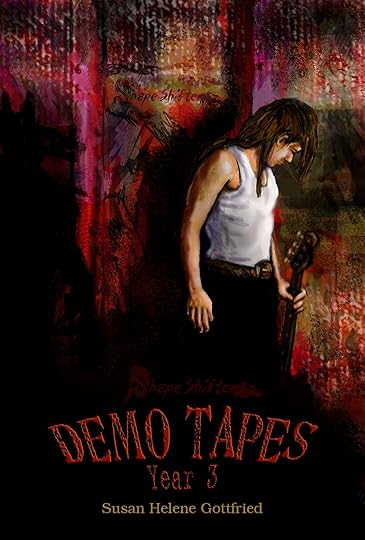
Purchase on Amazon
Guest Post by Susan Helene Gottfried
Back in June — it feels like a lifetime ago! — I released my fourth book, ShapeShifter: The Demo Tapes (Year 3). It's my third short story anthology, and the fourth in the famed Trevor Wolff/ShapeShifter series. The Trevolution, as I call it, continues to rock on.
Remind me never to release another book in the summer. This is the second year I've made the same mistake. It's a biggie.
Oh, sure. I know what you're thinking. It's not a mistake! People read more in the summer, beside the pool. I get to include this new book in the Smashwords Summer Sale, which only has a few days left, so get over there and check out some good stuff. Releasing a book in the summer ought to be the way to go.
For me, ever the rebel, a summer release is a huge mistake. Know why? My kids are still young enough that, as soon as school gets out, I become the Mom Entertainment Unit.
Now, I genuinely like being the MEU. I like my kids. They are fun, smart, eager to embrace life and new things… oh, wait. That last one is me. My kids are more cautious than I am.
So now I have two problems. The first is that I ought to spend my summers here at my desk, making sure the world knows I've put out a new book. I ought to be writing new fiction, revising old. I ought to be doing this and that, all at my desk, all in the name of working and selling books so we have money to do these fun adventures. (and donating part of my royalties to charity. Don't forget I like to do that, too.)
The second problem is that I'm more adventurous than my kids. Granted, that will probably change as my kids get older. They may be a bit on the young side for things like hanging off zip lines and the world's best wooden roller coaster and deep sea fishing and all the other things they back away from when I give them the chance to realize their ambitions.
I'm not sure I have the time to wait for my kids to catch up to their mom. Daily, I'm falling apart. Not like a zombie — I don't go to unclip my bike shoe from a spin bike at the Hoity Toity Health Club and find I've left my entire foot and shoe attached to the bike. Rather, despite being rather young for such a thing, I've got some osteoarthritis that's developed. I'm that creature yoga and pilates instructors hate: my joints are hyper-mobile. That leaves me more prone to injury, even as it protects me from breaking bones.
So between now and when I can't anymore, I want to get out there and do stuff. Live, not merely exist, as my favorite modern-day wise man once said.
For that reason, I don't begrudge days spent at the pool, or adventures with the kids. People tell me they aren't this age forever and while I know that's true, part of me remains convinced I'll be that rare parent who is so utterly cool, the kids — and their friends — will want me around forever.
That's why summers are hard for me. I miss being here at my desk, writing. I love what I do, or else I wouldn't do it. I often say I need to write the way I need to breathe, and maybe that means I'm a writer first and a mother second.
I don't tend to look at it that way. To me, they're both equal.
So… Demo Tapes: Year 3 is my last summer release, at least until the kids are old enough to not want or need much more than the car keys. After all, any book needs publicity. If I'm off with my kids all summer long, there goes my publicity department, off to the science center or a bike ride or whatever else it is I'm taking them.
I can't begrudge it. I really can't, even as I see my newest literary child struggle to be heard in the deluge of other books released this summer. After all, if we writers never come out from behind the computer screen, if we never experience life, what will we have to write about?
Still, it'd make me feel a lot better if you'd go take a look at Demo Tapes: Year 3. Like I said at the beginning of this post, it's on sale at Smashwords for another few days yet. I've marked it down to half price, which means for $3, you can have all four of the books in the Trevolution. $3 will let you hang with a rock band and as old and falling apart as I am, not even I remember when a concert ticket was that cheap.
I'm glad of that last part. Heck, I'm glad of all of it. To be a writer, to be here visiting with Thea's readers today, to have made the time to write this post in between hikes in the woods and trips to the library. Heck, I'm probably at one of these locations I've mentioned today, but I still welcome you to chat with me in the comments. As I dart in and out, I'll stop in and see what you guys have to say. If you love/hate summer book releases, if you read more in the summer, or even what you do to fill your summer days. Let's talk. It'll make me feel better about telling the kids we gotta cut it short so I can make some new friends.
Stay cool for the rest of the summer — and read some great books!
-30-
Bio:
Susan Helene Gottfried is the author of ShapeShifter: The Demo Tapes — Year 1, ShapeShifter: The Demo Tapes — Year 2, Trevor's Song, and ShapeShifter: The Demo Tapes — Year 3. She can be found online at http://westofmars.com, where you can find The Meet and Greet, among other goodies.
A tone-deaf rocker-at-heart, Susan worked in retail record stores, in radio stations, as stage crew, and as a promoter while earning two college degrees in creative writing.
Susan walked away from a continued career in the music industry in order to write books, so it makes sense that most of her fiction revolves around rock bands. Once you get those record stores, radio stations, and fellow roadies and promoters under your skin, they never leave.
When not writing, Susan captains the team at Win a Book, a promotional site for authors and book bloggers — and readers like yourself.
Buy links for Year 3
Kindle:
Smashwords:
Print at Amazon:
BTW by Thea:

God in the Machine is free. totally free
I met Susan on Facebook and then we started chatting on Twitter. I'd love to meet you too on Twitter (I'm @theaatkinson) and I'm sure
she'd love a follow (@westofmars)
No rock gods were harmed in the making of God in the Machine: a free short on Feedbook and Smashwords. You're welcome to grab it
up and enjoy for your Kindle, Nook, or whatever.
Filed under: guest blogging








July 21, 2011
Chasing the light by @theaatkinson
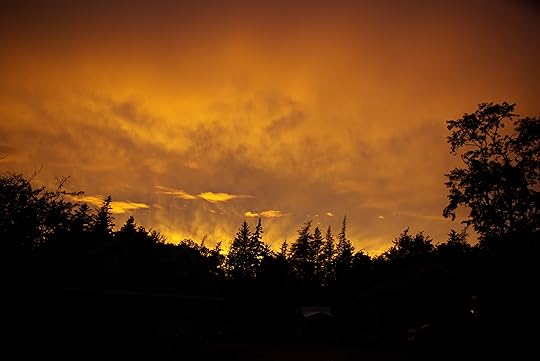 A visual artist friend of mine thought I'd enjoy a week-long artist retreat to Prince Edward Island a few years ago.
A visual artist friend of mine thought I'd enjoy a week-long artist retreat to Prince Edward Island a few years ago.
"After all," she said. "Writing is an art."
Reluctantly, I agreed to go, thinking that as I couldn't draw a stick figure, I could at least bring my camera and learn to take better pictures.
"There's something strangely intriguing about dogging around PEI's countryside with a trio of artists," I wrote in my journal on day one. "Nothing is as it appears."
Indeed, nothing was. We pulled over at fields striped by lawn mowers and skies polka-dotted by clouds. There were always spurts of, "Oh my God, the light," from the three artists, and an inevitable, accidental initiation of the windshield wipers as the driver got so excited she whacked the gear-stick in an effort to pull the van off the road.
Blue was often the topic of conversation through those first hours. "It's a strong color," they told me. So, too, was green, a secondary color made by combining 95% blue to 5% yellow. I remember thinking about school day biology lessons that taught blue irises signaled weak eyes, and I considered, in light of this new information, that perhaps blue eyes were weak because the strength of the color forced them to see more.
They returned to the van, all three having painted the same scene differently. The results had nothing to do with talent, I realized, but with cones and rods and their journey to a tangle of synapses. Each tangle with its respective knots is different. And so the scene is painted, the sketch drawn.
On day two we went field traipsing. They discovered water in the field. Again, blue; again green. I couldn't help feeling it was sacrilegious, somehow, to stomp heavy-footed over earth that still harbored food. But the artists, they were driven.
When talk moved later at the cottage to shadows and how blue silhouettes cast on red makes mauve, I promptly said that I hadn't known shadows could be any color other than black.
"Start noticing," one told me and I stood watching the darkness that began filtering through the day. Soon, as I stood alone on the veranda, I heard a delighted squeal coming from inside as another artist discovered the mauve shadows painted on the red gravel drive.
I wondered why I had to be shown, but the other artist just saw and chalked it up to the cones and rods again–or their glasses. I studied their eyes, my three artists, and noticed they all wore glasses. Perhaps there was a blue filter in their lenses–or in their retinas. Yes. That was it, I decided. That was the explanation. They had that strong color embedded as a filter deep in the flesh of their eyes and that was the reason they saw differently.
We began the third day by toddling down to the beach to watch the sun rise and cast shadows on the ruddy sand and layers of rock. One of them stripped down to bloomers and swam while the sun painted the water oily and the sand orange. There was a freedom in the air, as if her aura reached out and spread over the water like gasoline. If I could have ignited it, it would have burned off quicker than the camera could register–it was that intangible.
Afterwards, we drove directly to Bumblebee Road because they wanted to indulge my desire to capture on film a long line of honey bee hives. While I snapped away, one of the three had a whelming desire to pee in the field. She said that the white-bundled hay reminded her of rolls of toilet paper. Her peculiar tangle of synapses set up the shot for me. The other artists immediately agreed to bare their butts for the camera and for the sake of art.
Intriguing business, recreating what the eye sees. Because it really isn't recreating, I discovered. And how shocked I was at the discovery, until I realized how tainted we all are by our own perceptions.
By day four, I'd learned something further about shadows; they are an absence of light. They weren't black or blue or black and blue, but a darker color of where they lay. I wanted to know if a shadow on green was a darker green, then what shadow color would be on white. None of the artists relieved me of the question, but all looked at each other with a quiet sort of intimacy.
On the second to last day of the retreat, we happened upon a wonderful village of barns that far out-villaged all the ones that had come before. The artists were beside themselves. Ransackle buildings in all their natural glory screamed at them to be painted. The 75-year old bachelor who owned the farm took great pleasure showing us around, and stood bewildered as the artists complimented him on the various bits of well-used and often worn-out equipment: empty window frames hanging against a cob-webbed wall, rusty heads of rakes hidden beneath a sack of grain, exterior walls devoid of paint and weathering in the sun. We spent the entire day with him, and I think by evening he began looking at his ordinary farm with slightly different eyes than he had before.
In the end, I came away with little writing and precious few pictures because my rolls of film hadn't been engaged properly, but what these artists instilled within me will last a lifetime.
They found beauty and value in the most ordinary items. Things that I took for granted, they admired. There's a lesson there. Many things are worthy of appreciation; it's up to us to see them and as writers to capture them.
Now I wear blue colored sunglasses when I drive–to perdition with the rose.
-30-
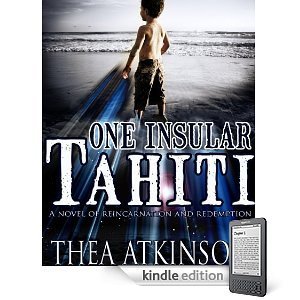
Samples are always free on Amazon
BTW: The East Coast has some of the most beautiful scenery in Canada. I set most of my novels in NS, but One Insular Tahiti had some Cape Breton sprinkled in. I'd love it if you would sample it. No pressure. Just see if it's your cuppa.
Filed under: Uncategorized








July 20, 2011
Writer Wednesday exercise: Brainstorming ideas by Ava Jae
I get asked it all the time; you do too, I imagine, if you're a writer: "Where do you get your ideas?"
I dread that one almost as much as I dread the question about what my book is about. I still haven't nailed that one yet. The truth for me is that I really don't know.In a post on Jason McInytre's blog, I told him that my approach to writing is one of discovery and that it's always a pleasant surprise to find something I write holds up to the research. He seemed to 'get it', which leads me to believe that stories and ideas are out there in the ether somewhere, waiting to be pulled down and brought to life.

Purchase Thalo Blue on Amazon
For instance, in One Insular Tahiti, I write about an event in WWII where a whole regiment of Nova Scotia soldiers is surrounded and massacred by the German army–no big surprise there, I'm sure, as I bet it happened to a lot of regiments. But the kicker for me was that it HAD to be in an apple orchard–or at least apples had to be there somewhere.
First off, I had no idea if an entire group of Nova Scotians had been killed this way, but it was crucial to my plot so I needed to know it would match up loosely with history. If not, I'd have to change a bit of things. Imagine my surprise and delight when I find a link that discussed a North Nova regiment–and get this–an apple orchard. Some of the details I had added were sitting right there on the screen in front of me.
I found this link, at least. I think the others have disappeared into the internet never to be retrieved, but at least you can see the synchronicity.
I'm sure you're thinking, Brah. You could easily just be saying this and finding stuff to match what you say. Sure. Sure, that could happen, but it didn't. It always amazes me that the universe can offer us such aid when we need it. And for me, it's all from the discovery of writing.
So the writing exercise is to write and let yourself discover something: Discover a character,
a concept, a plot, a new world. Just write for 10 minutes and see what comes.

comment to enter the montly draw
Remember to come back and tell us how it went. this month the gift for a lucky random commenter is Mel Comley's Impeding
Justice. Simply comment on Writer Wednesdays and get entered into the monthly draw.
And if you don't like this exercise, The Writing Network (twitter ID @theladywrites) has a different
one you can try. It's just about getting creative and feeling inspired. Doesn't matter to me whose exercise you do, just exercise.
To get your engines revving, I offer this piece on brainstorming from Ava Jae. I think you'll really enjoy it.
Brainstorming
by Ava Jae
As I'm currently in the brainstorming-editing-brainstorming-rewriting-brainstorming-WAITING FOREVER TO EDIT MY RECENTLY FINISHED WIP!-stage, I thought it appropriate to talk about ferrets and how ridiculously adorable they are.
Aha! Weren't expecting that, were you? Just kidding. Today I'll introduce you to my two favorite brainstorming techniques; one of which I've used for ages and another I just recently fell in love with.
TECHNIQUE #1: THE WHAT-IF GAME
I'm sure many of you have tried this, but if you haven't, for the love of all things bookish, TRY IT!
The What-If game is very simple. I'll describe it in steps, because steps are fun.
STEP ONE—THE MAGICAL QUESTION: sit down with a blank sheet of paper and a pencil (or pen or marker or crayon or keyboard or what-have-you) and at the top you write the miraculous words "What if…?"
STEP TWO—DOT: Now make a bullet point (or star or heart or fish because you can).
STEP THREE—BREATHE IN, BREATHE OUT, THINK: Close your eyes, take a deep breath and let the question hang. What if…what if what if…what if ALIENS INVADED THE EARTH AND THEIR ONLY WEAKNESS WAS…WAS…FERRETS! Ok, that one might be a tad bit ridiculous, but write it down anyway. There's no such thing as anything that's too out there for the What-If game.
In all seriousness, this really works. Start with an idea, a basic idea (What if I wrote about pirates?) and see how far you can push it. What if their Captain was a crazy, egotistical half-wit only someone as insanely talented as Johnny Depp could play convincingly? What if he didn't have a ship? A crew? What if the world was flat? What if they sailed over the edge?
This can go on forever people, FOREVER! And it'll help you uncover some gems you may not have thought of otherwise. Trust me.
TECHNIQUE #2: THE IDEA PAGE
As I mentioned earlier, I discovered this technique very recently, but it's quickly becoming a favorite.
The word page is simple and best done on a sheet of notebook paper or on a program that lets you write literally all over the page, like OneNote. I still think pencil and paper will work best, though. It helps with the whole freeing, creativity thing which is what you're going for here.
So! I was inspired by the Wordle word clouds online (http://www.wordle.net/ ) and thought it'd be fun to make one by hand, except instead of writing words that you use often, you write words that relate to whatever you're trying to write. Let's not get ahead of ourselves. Step by step, here we go!
STEP ONE—PAPER: Get your notebook paper out and turn it SIDEWAYS. I don't know why this helps so much but something about writing over the lines instead of conforming to the shape of the page really gets your right brain going.
STEP TWO—THE FIRST WORD: Write a word somewhere on the page. It can be as big or small as you like, except it's probably best that you don't take up the whole page (unless you want to cram the rest of your words in tiny little letters around it. Actually that might be fun. Maybe I'll try that.). Anyway! If all you know at this stage is that you're writing a dystopian novel, then go ahead and make your first word dystopian. Maybe you want to make your antagonist sympathetic. Write that. Maybe you only have a name. Go ahead and slap that baby down.
Great. Now you have the first word.
STEP THREE—GO CRAZY: This is pretty self-explanatory. Go crazy. Write all over the page. Write in funny angles if you want, different sizes, above and below the red line, around the holes in the page, it doesn't matter, write wherever you'd like. The goal is to fill up the page with ideas, words, thoughts, names, even full sentences that pertain to your new WIP idea. If you've got some symbol in your head, go ahead and draw it. There are no rules here. Use funny colors, use pens and pencils. Doodle if you'd like. Just think about your idea and get it down.
Best part is you can use either one of these at any stage of the game. Don't have a novel? Start with this. Stuck in the middle of a scene and don't know how to end it? Whip out the paper and get your brain storming.
I challenge you guys to try these at least once. Who knows? You might just find you like these methods too.
These are obviously only two of many different brainstorming techniques. What do you do to get your ideas on paper?
-30-
Bio: Ava Jae writes books and blog posts and spends unhealthy amounts of time on Twitter. When not reading, editing a WIP or dreaming up a new novel, you can probably find her nerding out on Photoshop or squealing over the newest X-Men movie.
You can follow her on Twitter: https://twitter.com/#!/Ava_Jae
she blogs at: http://avajae.blogspot.com/
BTW: by Thea

God in the Machine is free. totally free
I use a brainstorm technique when my writing stalls, but I use it in concert with freefall. Basically, I free word associate until I hit a word that 'sticks' then I freefall from that word. I use it more for short fiction like my free short story God in the Machine available at feedbooks and Smashwords.
Filed under: writerwednesday exercises











